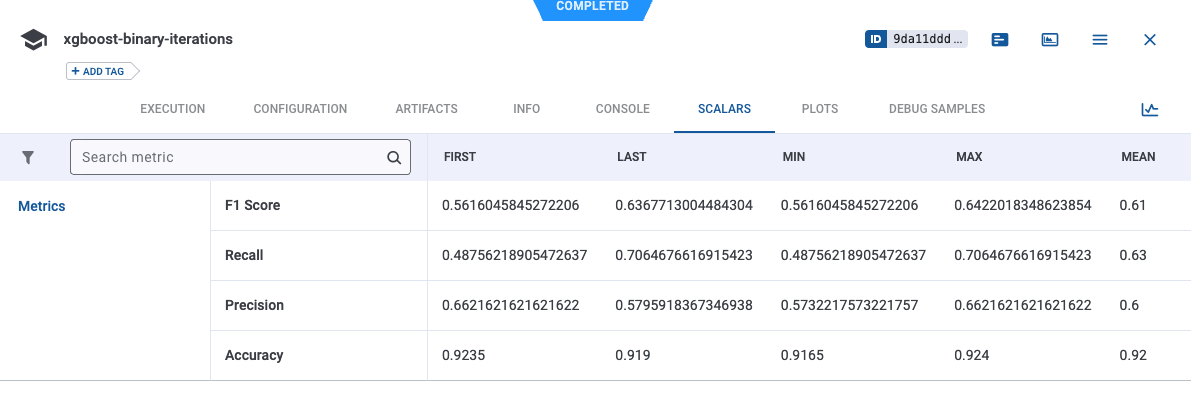Here's what I see on the webUI, but no indication of the f1 score from each of the cloned optimization tasks:
Are the cloned tasks running? Can you add logs from the HPO and one of the child tasks?
Hi Again! I'm trying to figure out why my HPO doesn't seem to work for this simple xgboost example I'm testing -- I see that the tasks are being cloned from the base model, but I don't see any outputs indicating what the evaluation metric is (in my case, F1 ) for each of the cloned tasks and as such cannot decide which task/its hyperparameter ( scale_pos_weight ) performed the best:
Here's the base model:
from clearml import Task, Model
from sklearn.datasets import make_classification
from xgboost import XGBClassifier
from sklearn.model_selection import train_test_split
from sklearn.metrics import accuracy_score, recall_score, f1_score, precision_score, roc_curve, auc
from utils.logging import run_and_log_eval_metrics, plot_and_log_auc
import matplotlib.pyplot as plt
import argparse
###### Argument Parser ########
ap = argparse.ArgumentParser()
ap.add_argument("-w0", "--weight_0", required = True, help="Y=0 Probability")
args = vars(ap.parse_args())
###### Enums ##################
RANDOM_STATE = 42
TEST_SIZE = 0.2
ITERATION = 0
SCALE_POS_WEIGHT = 1
CLASS_SEP = 0.7
NAME = 'xgboost-binary-train-base-model'
PROJECT_NAME = "XGBoost Experiments"
WEIGHT_0 = float(args["weight_0"])
WEIGHT_1 = 1-WEIGHT_0
WEIGHTS = [WEIGHT_0, WEIGHT_1]
##############################
# PART 0: Initialize ClearML
task = Task.init(project_name=PROJECT_NAME,
task_name=NAME)
logger = task.get_logger()
# Connect hyperparameters
params = {
'scale_pos_weight': SCALE_POS_WEIGHT
}
params = task.connect(params)
##############################
# PART 1: Generate a synthetic dataset with 2 classes
X, y = make_classification(n_samples=10000,
n_features=10,
n_informative=2,
n_redundant=2,
n_classes=2,
weights=WEIGHTS,
class_sep=CLASS_SEP,
random_state=RANDOM_STATE)
X_train, X_test, y_train, y_test = train_test_split(X, y, test_size=TEST_SIZE, random_state=RANDOM_STATE)
##############################
# PART 2: Initialize XGBClassifier, Train/Fit Model
model = XGBClassifier(objective='binary:logistic',
random_state=RANDOM_STATE,
scale_pos_weight=params['scale_pos_weight'])
# Fit the model to training data
model.fit(X_train, y_train)
##############################
# PART 3: Save Model, Upload Artifacts + Evals to Server
# model.save_model(NAME + ".json")
# artifact = task.upload_artifact("model", NAME + ".json")
# Get predictions
preds = model.predict(X_test)
# Evaluation/Logging
run_and_log_eval_metrics(logger, y_test, preds, iteration=ITERATION)
with the utils functions produced by the below code:
from sklearn.metrics import accuracy_score, recall_score, f1_score, precision_score, roc_curve, auc
import matplotlib.pyplot as plt
def run_and_log_eval_metrics(logger, y_test, preds, iteration) -> None:
accuracy = accuracy_score(y_test, preds)
recall = recall_score(y_test, preds)
f1 = f1_score(y_test, preds)
precision = precision_score(y_test, preds)
logger.report_scalar(title="Metrics", series="Accuracy", iteration=iteration, value=accuracy)
logger.report_scalar(title="Metrics", series="Precision", iteration=iteration, value=precision)
logger.report_scalar(title="Metrics", series="Recall", iteration=iteration, value=recall)
logger.report_scalar(title="Metrics", series="F1", iteration=iteration, value=f1)
I'm trying to optimize for the highest f1 score:
from clearml import Task, InputModel
from sklearn.datasets import make_classification
from xgboost import XGBClassifier
from sklearn.model_selection import train_test_split
from utils.logging import run_and_log_eval_metrics, plot_and_log_auc
import argparse
from clearml.automation import UniformParameterRange, HyperParameterOptimizer
###### Argument Parser ########
ap = argparse.ArgumentParser()
ap.add_argument("-tid", "--taskid", required = True, help="Task ID")
args = vars(ap.parse_args())
###### Enums ##################
# RANDOM_STATE = 42
# TEST_SIZE = 0.2
# CLASS_SEP = 0.7
# WEIGHTS = [0.9, 0.1]
NAME = 'xgboost-binary-find-best-balance'
PROJECT_NAME = "XGBoost Experiments"
############################################
# PART 0: Initialize ClearML
task = Task.init(project_name=PROJECT_NAME,
task_name=NAME,
task_type=Task.TaskTypes.optimizer)
############################################
# PART 1: Run Hyperparameter Optimizer (HPO)
optimizer = HyperParameterOptimizer(
base_task_id=args["taskid"],
hyper_parameters=[
UniformParameterRange('General/scale_pos_weight', min_value=1.0, max_value=10.0, step_size=1),
],
objective_metric_title='Metrics',
objective_metric_series='F1',
objective_metric_sign='min',
max_iteration=10,
execution_queue='default',
optimize_task_parameters=True,
)
optimizer.start()
optimizer.set_time_limit(in_minutes=1.)
# wait until optimization completed or timed-out
optimizer.wait()
top_exp = optimizer.get_top_experiments(top_k=1)
print([t.id for t in top_exp])
# make sure we stop all jobs
optimizer.stop()
print('We are done, good bye')
Here's what I see on the webUI, but no indication of the f1 score from each of the cloned optimization tasks:
Are the cloned tasks running? Can you add logs from the HPO and one of the child tasks?